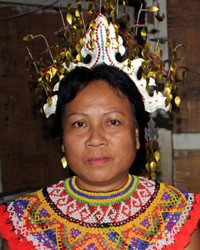Sea Dayak, Iban in Malaysia

Photo Source:
Anne Roberts - Flickr
Creative Commons
|
Send Joshua Project a map of this people group.
|
| People Name: | Sea Dayak, Iban |
| Country: | Malaysia |
| 10/40 Window: | Yes |
| Population: | 798,000 |
| World Population: | 834,000 |
| Primary Language: | Iban |
| Primary Religion: | Ethnic Religions |
| Christian Adherents: | 46.00 % |
| Evangelicals: | 14.00 % |
| Scripture: | Complete Bible |
| Ministry Resources: | Yes |
| Jesus Film: | Yes |
| Audio Recordings: | Yes |
| People Cluster: | Borneo-Kalimantan |
| Affinity Bloc: | Malay Peoples |
| Progress Level: |
|
Introduction / History
The British, who came into contact with the Iban people groups in the 1840s, mistakenly named them Sea Dayak, since they were formerly pirates and fisherman. They were also known as the most fearless headhunters on the island of Borneo. The Iban of today are no longer headhunters but are generous, hospitable, and peaceful people. They are the largest people group in Sarawak and are one of the main indigenous people groups in Brunei. The people groups under the Iban cluster, in addition to the Iban of Sarawak and Brunei, include the Balau, Remun and Sebuyau. All these Iban people speak different languages which are classified as a subgroup in the Malayic-Dayak family of languages.
Most Ibans live in Malaysia, but they also have a sizable number in Brunei and Indonesia.
What Are Their Lives Like?
Farming is the primary occupation of the Iban community, but few are self-sufficient, as they must purchase additional food to supplement what they grow. They grow cash crops such as pepper, rubber, cocoa, oil palm, and fruits. Some still hunt wild animals in the jungle. Traditionally, Iban hunted by setting traps or using blowpipes, but today, many train hunting dogs to run down their prey. They no longer rely on the rainforest's resources to survive. Increasingly, younger Iban are becoming qualified professionals and migrating to major towns and cities.
Traditionally, the Iban lived in longhouses. Some have now abandoned the longhouse style of living. However, many still maintain ties to their ancestral longhouses. Each settlement has two important officials: the tuah burong (religious head) takes care of all religious activities; and the tuah rumah (village head) is the administrator and custodian of Iban customary law and the arbiter in community conflicts. However, the Iban are a very democratic and egalitarian people. All adults have a say in how the community is run.
Some of the Iban peoples' unique and colorful festivals are the Gawai Dayak 'harvest festival', Gawai Kenyalang 'hornbill festival', and Gawai Antu 'festival of the dead'.
What Are Their Beliefs?
Like most other ethnic groups in Sarawak, the Iban are traditionally animists. Many still hold strongly to their traditional rituals and beliefs, many of which integrate closely with rice planting and harvesting. Rice agriculture is a highly ritualized activity and is really a complete way of life, rather than merely an economic pursuit. Nearly all of their religious ritual has to do with ensuring the success of the crop. Ibans believe rice has a soul. At the annual Gawai Dayak, the rice harvest festival, many gather to witness the rice spirit appeasement ceremony.
Today, many of the Iban are Christians, while a growing number are marrying into Malay Muslim families. It is common to see a mixture of traditional Iban and Islamic Iban families living together in a modernized Iban longhouse.
What Are Their Needs?
Despite living on fertile land with adequate rainfall, food production is insufficient for their needs. The Iban could benefit from improved agricultural training.
Prayer Points
Pray for the Lord to provide a record-high harvest as a testimony of his goodness and power.
Pray that God will touch the hearts of local believers to help Iban people who need to develop their economy.
The good news is available in one major Iban language; pray for many to read and heed God's word.
Pray that soon Ibans will be used by God to herald Christ's blessings to the Muslims.